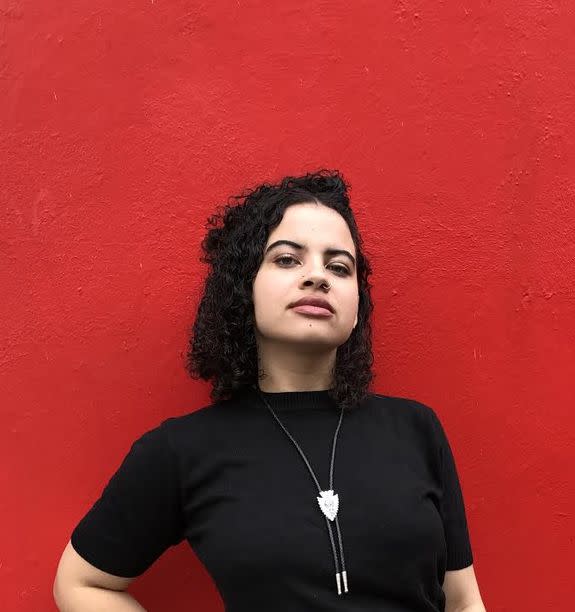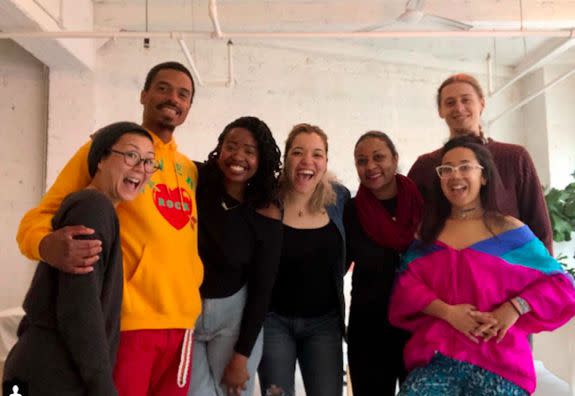Astrology is booming, and it's queerer than ever

There's something about astrology that's always been, well, kinda queer.
Travel all the way back to the time of Ptolemy (AD 100) and there you'll see him, using the stars to divine wisdom about gender norms and identity. Once the science of kings, astrology has become an outsider's spiritual practice — beholden to no prescriptive theology and no major religious leader, just the wisdom of the charts.
No wonder, then, that astrology has had a resurgence in the past few years. "Astrology always comes to the forefront whenever there's a great change," says Christopher Renstrom, a gay astrologer and the author of Ruling Planets: Your Astrological Guide to Life's Ups and Down. "Whenever there's a revolution or change or when institutions fail, there's astrology."
If the president won't protect the LGBTQ community, there's always the stars.
SEE ALSO: Meet the ‘basic witches’ who are moving witchcraft into the mainstream
Barely a day goes by in which some digital media outlet doesn't draw a meaningful connection between millennials and astrology. Take Marketwatch's "Why millennials are ditching religion for witchcraft and astrology" last December; the Atlantic's "Why are millennials so into astrology" in January; and just two months later, "Why astrology is turning to millennials" in the Guardian.
Slightly less attention has been paid to the growing population of queer and trans astrologers. Yet there's always been a powerful connection between the stars and the LGBTQ community, Jessica Lanyadoo, San Francisco-based astrologer, tells Mashable. It's just gotten stronger in recent years:
"Queers are always ahead of the trend!" Lanyadoo says. "I've been a self-employed astrologer since 1999, and I've always worked with queer people, artists, and social workers more than anyone ... Let's thank the internet, too. More people of color and more queer people can now self-publish their views as astrologers and spiritualists."
A post shared by Jessica Lanyadoo (@jessica_lanyadoo) on Apr 18, 2018 at 9:51am PDT
It's not that astrologers couldn't self-publish before the dawn of the internet (where my zine folks at?). It's just that social platforms, especially visual ones like Instagram and, previously, Tumblr, are able to attract much larger audiences than when astrologers were only able to publish in print. There's no need to rely on Cosmopolitan or local, mostly broke newspapers for clients when astrologers can take to the world wide web.
Forgive my optimism, but sometimes these platforms are just ... good. Because Instagram is used predominantly by women (38% of American women use the app, compared to just 21% of men), women astrologers have been able to find a home there. Love it or hate it, the platform is simply more adept than print when it comes to supporting diverse voices, including LGBTQ ones.
But, as any astrologer worth their salt will tell you, the relationship between astrology and queer and trans folks goes back. Waaaaay back.
So how did it all start?
Renstrom loosely locates the beginning of the relationship between queers and astrology with Ptolemy, who examined planetary configurations to predict human behavior. In fact, much of his work centered on the relationship between planetary behavior and sexual behavior. Renstrom argues that the beginnings of astrology were thus optimized to be non-prescriptive and inclusive (i.e. good for trans and queer folks):
"A number of ancient texts referred to astrology and ... it wasn't associated with finding solutions. It wasn't saying, 'Hey, you've got a problem that needs to be rectified.' It was about looking at the astrological chart and examining what's going on."
Astrology remained popular throughout the medieval and Renaissance eras, with people studying the art in universities and then serving as highly educated astrologers in the court.
"Astrology has been used to chart different times in history based on the interaction between two planets," Jaelissa Sipress of Obsidian Moon Astrology, says. "Historically, the greatest political leaders had personal astrologers."

Image: courtesy of obsidian moon astrology
"Church was the main corporate sponsor of astrology until the 1600s!" Renstrom concurs. Some lay Christians of the period viewed astrology as a means of conjuring the divine in their everyday lives. For them, astrology was a way to access spirituality without the distant rituals and strange sacraments.
Sound familiar?
It wasn't long, however, before both scientists and the church ganged up on the practice, fearing it had become too powerful — either as a fossil science or heretical spirituality.
Thereafter, astrology became something of an "intellectual refugee," as Renstrom calls it.
It didn't disappear entirely. Instead, it became an outsider's art, or in more mainstream contexts, a shallow, commercially viable fun hobby.
This position — mainstream enough to reach diverse audiences and stigmatized enough to be treated as something of an academic "other" — made astrology ripe for embracing by LGBTQ folks, including QTPOC communities, in the 21st century.
"There's not a religious value system attributed to astrology," Lanyadoo says. "There's just a real openness that organically resonates with queer people. There's something greater than ourselves."
A non-discriminatory universe
Let's not get ahead of ourselves. Astrology didn't always embrace queer communities. Nor were previous astrologers the community's best advocates. In 2000, gay astrologer Peter Clamp wrote a piece entitled "The Astrology of Homophobia," enjoining fellow astrologers to be more inclusive of the queer community, both in their personal practice and in their readings.
Of gender identity and sexuality, Clamp had this to say of astrological symbols:
"[They] should not necessarily be solely aligned in human terms with physical men and women. Indeed, there is a little bit of man in every woman and woman in every man and a whole lot of Universe within each of us."
The conclusion resonated. Others who came after Clamp voiced similar concerns, all organized around the same principle: that the planets embraced queer and trans people for who they were.
Anna Facci is a queer, non-binary astrology fan living in the heart of the Bible Belt — Oklahoma City, Oklahoma. For Anna, astrology is the practice that "called them home" to live in their conservative state, even though a traditionally liberal city might be more welcoming:
"In places like Oklahoma," Facci says, "where so many of us queer folks have horror stories around being cast out of communities or having biological kinship ties severed because of conservative religion, queer astrology gives us space to be reminded that we're holy and connected to the stars, even if there are people who don't see us that way."
Chani Nicholas is one of the internet's most famous queer astrologers, with 19.6 thousand followers on Twitter, more than 88,000 people following her on Facebook, and a record 117,000 tracking her on Instagram, perhaps the best platform for budding astrologers.
For years, Chani has explored the connections between astrology and the queer community. Like Anna, Chani agrees that astrology's expansiveness — "there are as many manifestations of gender as there are people on the planet, and there are stars in the sky" — is key to its appeal to oppressed groups:
"Queer, trans, and gender nonconforming folx, and many marginalized communities, in my experience, have always been attuned to wisdom traditions, art practices, mythologies, and story-telling that explores the value of life beyond the normative conditions we've been given, but cannot exist within joyfully."
A post shared by Chani Nicholas (@chaninicholas) on Mar 8, 2018 at 9:52am PST
The math is simple. As the practice becomes more diverse and its practitioners more inclusive, the number of people included ... grows.
Whowouldathunk?
The Trump-trans-queer astrology effect
Astrology's growth among all kinds of communities is impossible to neatly quantify. But Ashley Brockington — a life-long astrologer and tarot card reader at MINKA, a Brooklyn-based "healing and wellness space" that focuses on "representing Practitioners of Color, immigrants, and folks from the LGBTQIA+ community" — has observed its booming appeal among everyone from queer people of color to white suburban moms in the past two years.

Image: courtesy of minka
Now 46, Brockington, "a black cis female identified Aquarius femme" has been working with astrology since 1992. That's when she realized, "Life has meaning and is awesome. And I'm not living awesomely." She's seen the practice grow both as a trend and as a healing modality. While popular culture may have relegated astrology to the back pages of magazines, Brockington chooses to instead highlight its transformative spiritual potential, especially for people at the margins and in times of great chaos:
"We're all pretty traumatized. All of us. Queers specifically," Brockington says. When Trump was elected: "I didn't want to succumb to the fear of Trump. This was a challenge: How do we rise to that challenge AND continue our own spiritual growth? We queers have had the [historical] ability to take our own growth, healing, and protection into our own hands."
That kind of DIY spirituality — combined with a strong sense of solidarity — has animated a number of astrology-based practices and Instagram accounts in the past few years. Brockington began some of her work at Harriot's Apothecary, a "black female-centered collective of cis and trans women healers." She sees even more black mystics achieving cultural prominence at this moment.
Astrology might not be the most direct path to justice, but for many of its queer and trans practitioners, it's a radical, personal-meets-spiritual-meets-political step forward.
"I have seen my business steadily grow over the past seven years," Nicholas says. She adds, "After the inauguration, however, there was a noticeable spike in the need for content that was proactive, consoling, encouraging, grounded, explicitly political, and critical in its analysis of system oppression."
"The idea that the spiritual is not political is wildly inaccurate," Lanyadoo concurs. "The spiritual and the political are interwoven. It's not possible to be silent in the face of injustice as a spiritual person."
Astrology is with us. For now
For whatever reason, whether it's Trump, Instagram, or some combination of the two, it's clear that astrology, once considered an "intellectual refugee," is regaining some measure of respectability. Fans don't seem to care that many scientists are skeptical of the practice. Scientists are often wrong, some claim. And they're not exactly asking for Politifact to review the evidence.
Astrology serves a different spiritual need, the argument goes, especially for queers and trans people who've often been denied the right to a spiritual life.
That matters.
cuz if you can’t laugh at yourself you’re just a derk. #horoscopelyfe 🌎🌕 . RP source unknown
A post shared by Jessica Lanyadoo (@jessica_lanyadoo) on Feb 24, 2018 at 10:44am PST
As with any trend, these things are cyclical. It's very possible that the demand for astrology will diminish over time and fade into the background, especially if Trump leaves office and some sense of peace is restored. Alternatively, astrology could become too mainstream and too commercialized, and lose the emotional credibility it once had among people at the margins.
Fans of the practice aren't exactly worried. They're happy to have more people in their community, even if it's just temporary.
"It's a beautiful language!" Brockington exclaims. "The more people speak it, Hallelujah."
WATCH: Astrology lovers will rejoice over these freckle tattoos


